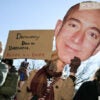A 60 Minutes segment that aired last Sunday, “Drones over America,” offered a friendly reminder that not all drones are bad and that drones are indeed coming. “We’re looking at the future. And whether we like it or not, the future is looking back at us,” as CBS correspondent Morley Safer phrased it.
The technology for commercial and private use of drones is already available, but the Federal Aviation Administration (FAA) prohibits their use. The FAA has been working on regulations for drone usage for almost a decade, and until they are complete, the FAA bans all use of commercial drones.
This has put the U.S. commercial drone industry lagging behind global peer competitors. Australia, Germany, Japan, South Korea, and the United Kingdom have all started to use drones for commercial purposes.
Chairman of the Senate Intelligence Committee Diane Feinstein (D–CA) declared in her comments to 60 Minutes that “privacy concerns are very, very major.” Yet legislation that requires the FAA to regulate privacy issues, such as the bill proposed last November by Senator Ed Markey (D–MA), is a mistake. Privacy laws and legal precedents that address civil liberty concerns already exist, and they should be used to govern domestic drone use.
As outlined in a detailed Heritage report, the way forward is clear. Congress should permit the FAA to continue its rulemaking over the domestic use of drones—but only in respect to its limited expertise in issues of safety and airspace. Additionally, Congress should condition the expansion of domestic drones on the development of clear guidelines for their permissible use and the development of an oversight and audit mechanism.
Proper guidelines should recognize and authorize the legitimate use of drones that hold no appreciable risk to civil liberties, such as border security, disaster response, crop dusting, or package delivery. These guidelines should also include rules that prevent the militarization of domestic drones, prohibit the use of drones to monitor First Amendment protected expressions, and ensure that drones do not become another tool for the collection of large sets of unstructured surveillance data.
The laws and rules for privacy are well established, and they will still apply to drones. The domestic use of drones should not be allowed to abridge constitutionally protected civil liberties, but neither should the fear over possible hypothetical abuses be allowed to stand in the way of the future.
Jared Ferris is currently a member of the Young Leaders Program at The Heritage Foundation. For more information on interning at Heritage, please click here.



























